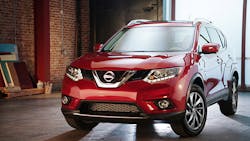Nissan Motor Co. (IW 1000/33) edged past rival Honda Motor Co. in this year’s first half growing faster in the U.S. than any mass-market carmaker.
CEO Carlos Ghosn wants Nissan to pass Honda and get 10% of the North American market. Yet Nissan’s growth this year has been helped by more generous incentives to customers and by selling more low-margin vehicles to rental fleets, which have risen faster than any other automaker’s.
Ghosn’s push for sales risks delivering growth at the expense of margins. It also underscores the fact that U.S. market expansion is slowing and another record year is looking less likely. So growth-hungry companies like Nissan may need to spend more to boost sales.
“They’re going at it at all costs,” said Jessica Caldwell, an analyst at car-pricing website Edmunds.com. “To get 10%, Nissan is really chasing sales volume over margins.”
Nissan isn’t doing it all with low-priced sales. The new Maxima sedan and Rogue sport utility vehicle have been hits. In the second half of the year, the company will increase production of its new Titan pickup truck and Armada full-size SUV to boost deliveries, said Judy Wheeler, vice president of U.S. sales for Nissan. She said Nissan started making Rogue SUVs at a Kyushu, Japan, factory this year, in addition to production in the U.S. and South Korea.
“The compact SUV segment is on fire right now and we made a concerted effort to go after it,” Wheeler said.
In the first half, Nissan sold almost 800,000 vehicles in the U.S., beating Honda by about 6,000 and pushing its own market share to 9.2% from 8.6% in the same period last year, according to Autodata Inc. Nissan now has 9.7% market share in North America. To hit its 10% target, the company will need to reach about 9.5% in the U.S., Wheeler said.
July sales reports are expected to show that Nissan’s deliveries rose 3% from a year earlier, while Honda may post a 0.4% drop and Toyota may be down 2.9%, according to a Bloomberg survey of analysts.
Ford Motor Co. and General Motors Co. will be down 0.5% and 1%, respectively, based on the projections.
Fiat Chrysler Automobiles NV will report a 1.9% gain, according to the survey. The automaker acknowledged last week that it’s being investigated by the U.S. Justice Department and the Securities and Exchange Commission for how it reports sales. It restated its vehicle deliveries, revealing that its streak of increasing monthly sales actually ended in 2013.
The average estimate for the seasonally adjusted annual selling rate is 17.6 million cars and light trucks, little changed from July 2015 and an increase from June’s 16.7 million pace.
Fleet Customers
For Nissan, fleet sales rose 42% in the first five months of the year to 175,505, according to the most recent data from R.L. Polk & Co., as Honda sold fewer than 10,000 vehicles to fleets. Most of Nissan’s fleet sales went to rental agencies, which tend to buy cars at a discount and order them with fewer price-boosting options than those sold to individual consumers. Without fleet sales, Honda would have outsold Nissan in the U.S.
Wheeler said Nissan’s increase in fleet sales is because the company didn’t have new 2016 model-year cars to sell to those customers late last year. This year, the automaker had a backlog of orders and has filled them in recent months, so fleet sales should decline in the second half, she said.
Only GM, Ford and Fiat Chrysler have sold more vehicles to fleets. The Detroit Three tend to do more business with government agencies, which often have a mandate to buy from U.S. companies, and they sell pickup trucks to corporate fleets.
Honda doesn’t need to push business with fleets, said John Mendel, executive vice president of American Honda Motor Co. Rental agencies like compact and mid-sized cars, and retail sales, those to individual customers, of Honda’s Civic and Accord are growing, he said in a phone interview.
Nissan has also stepped up its incentives, averaging about $3,400 a vehicle this year through June, a 6% increase from a year earlier, according to Autodata Corp. Honda’s average was $1,630, down 11%. Among mass-market automakers, only the U.S. companies spent more than Nissan.
Earnings Effect
Nissan’s push for sales volume may already be having an impact on earnings. The company’s operating profit fell 9.2% in the fiscal first quarter, which ended June 30. A lot of that was because of currency issues, Chief Financial Officer Joseph Peter said on a July 27 conference call with analysts. He also said sales incentives were higher than anticipated and also played a role in reducing the earnings.
Honda has been stronger in the U.S. when it comes to retail sales. Not only does the company sell very few cars to fleet customers, its incentives have been far lower than Nissan’s.
“If you look at Nissan, their fleet business is up” Mendel said. “They’re targeting us. If you want a bragging rights claim, fleet is where you go. That’s just not our business model.”
By David Welch and Polina Noskova
About the Author
Bloomberg
Licensed content from Bloomberg, copyright 2016.
